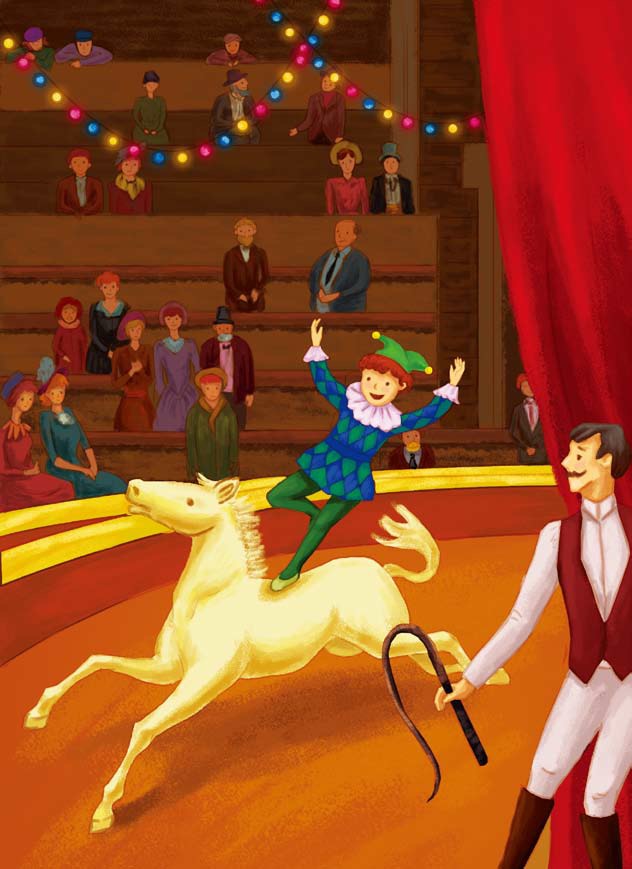On the stroke of two the band struck up, and at the same moment the mayor, the prefect, the judge, the _provveditore_, and many other gentlemen, all dressed in black, mounted the stairs on the right, and seated themselves on the red chairs at the front of the platform. The band ceased playing. The director of singing in the schools advanced with a _baton_ in his hand. At a signal from him all the boys in the pit rose to their feet; at another sign they began to sing. There were seven hundred singing a very beautiful song,--seven hundred boys' voices singing together; how beautiful! All listened motionless: it was a slow, sweet, limpid song which seemed like a church chant. When they ceased, every one applauded; then they all became very still. The distribution of the prizes was about to begin. My little master of the second grade, with his red head and his quick eyes, who was to read the names of the prize-winners, had already advanced to the front of the stage. The entrance of the twelve boys who were to present the certificates was what they were waiting for. The newspapers had already stated that there would be boys from all the provinces of Italy. Every one knew it, and was watching for them and gazing curiously towards the spot where they were to enter, and the mayor and the other gentlemen gazed also, and the whole theatre was silent.
兩點一到,樂隊開始奏樂。同時市長、知事、判事及其他的紳士們都著了黑禮服,從右邊走上舞臺,坐在正面的紅椅子上。學校中教唱歌的先生拿了指揮棒站在前面,他座里的孩子因了他的信號一齊起立,一見那第二個信號就唱起歌來。七百個孩子一齊唱著,真是好歌,大眾都肅靜地聽著,那是靜穆開朗的歌曲,好像教會里的贊美歌。唱完了,一陣拍手,接著又即肅靜。獎品授予就此開始了。我三年級時的那個赤發敏眼的小身材的先生走到舞臺前面來,預備著朗讀受獎者的姓名。大家都焦急地盼望那拿獎狀的十二個少年登場,因為報紙早已刊登了今年由意大利全國各區選出代表的消息,所以從市長、紳士們到一般的觀者都望眼將穿似的注視著舞臺的入口,場內又復靜肅起來。

All at once the whole twelve arrived on the stage at a run, and remained standing there in line, with a smile. The whole theatre, three thousand persons, sprang up simultaneously, breaking into applause which sounded like a clap of thunder. The boys stood for a moment as though disconcerted. "Behold Italy!" said a voice on the stage. All at once I recognized Coraci, the Calabrian, dressed in black as usual. A gentleman belonging to the municipal government, who was with us and who knew them all, pointed them out to my mother. "That little blond is the representative of Venice. The Roman is that tall, curly-haired lad, yonder." Two or three of them were dressed like gentlemen; the others were sons of workingmen, but all were neatly clad and clean. The Florentine, who was the smallest, had a blue scarf round his body. They all passed in front of the mayor, who kissed them, one after the other, on the brow, while a gentleman seated next to him smilingly told him the names of their cities: "Florence, Naples, Bologna, Palermo." And as each passed by, the whole theatre clapped. Then they all ran to the green table, to take the certificates. The master began to read the list, mentioning the schoolhouses, the classes, the names; and the prize-winners began to mount the stage and to file past.
忽然,十二個少年上了舞臺,一列排立。都在那里微笑。全場三千人同時起立,拍手如雷,十二個少年手足無措地站著。“請看意大利的氣象!”場中有人這樣喊。格拉勃利亞少年仍舊穿著平常的黑服。和我們同坐的一位市政所的人完全認識這十二個少年,他一一地說給我的母親聽。十二人之中,有兩三個是紳士打扮,其余都是工人的兒子,服裝很隨便。最小的弗羅倫薩的孩子,纏著青色的項巾。少年們通過市長前面,市長一一吻他們的額,坐在旁邊的紳士把他們的出生地告訴市長。每一人通過,滿場都拍手。等他們走近綠色的桌子去取獎狀,我的先生就把受獎者的學校名、級名、姓名朗讀起來。受獎者從右面上舞臺去












